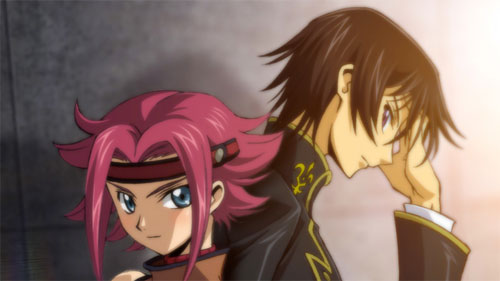Code Geass starts with a lots of strikes against it. Let’s list a few:
- Character designs from Shojou uber-group CLAMP. Aloof pretty-boys with angular features must be the order of the day.
- Giant robots. This is a draw for some folks, not for me. They tend bring a lot of baggage.
- Japanese patriotism. Everybody gets to be proud of their country, I get that, really I do. That said, oldies like Starblazers have already taken the sci-fi metaphor for America’s occupation of Japan everywhere that premise needed to go.
- High-school hijinks. Everybody can identify with school drama and school romance and school comedy. I have no particular problem with school-based stories, except when combined with other premises that I already take issue with. Throwing some stereotypical shy-students-in-love-dodecahedron tripe in with a contrived romantic-comedy harem or Japanese Liberation Front sci-fi war saga, and it’s bound to be trouble.
- Strong-headed student council president. This falls under high-school hijinks, really, but deserves special credit. Oh! Great ruined this character archetype for me with Tengo Tenge, though others had damaged it before him.
- A demure, frail, wheelchair-bound, kind-hearted blind girl. What? That’s a joke, right?
- Mysterious science-experiment-girl. Not the redhead in the picture above, but there’s what amounts to a djini in a bottle that has escaped from the evil empire’s scientific laboratories. This isn’t a thematic dead horse or anything.
- Mysterious ancient magic-girl. Same girl as above. Her mysterious sci-fi past also appears to be some kind of mysterious magical mythology past. Oh boy, this is really starting to add up.
But some how it’s working. I’m still not clear on why I even gave Code Geass a chance. There have been other titles that were well-received by the discerning anime fans that I just never got around to (such as Nadesico, also featuring giant robots), but fourteen episodes in I’ve found that production studio Sunrise has risen above the traditional confines of its component genres. The principle characters are accessible, in that you can readily identify the familiar archetypes they’re built around, but have layers of complexity built onto them. In most cases, this is done without getting too heavy-handed about character development.
Despite the heavy, heavy handicaps this series brings along from its very conception, Code Geass is a solid series with well-executed action sequences, an interesting cast of characters, excellent production values, and good pacing. Give the first couple episodes a chance, and it may draw you in, too.

What a marvellously roundabout way of recommending a series ^^ Would’ve totally worked for me if I wasn’t already following Code Geass. ^^ ITA with all your bullet points, esp. bullet four. And I thought “Throwing some stereotypical shy-students-in-love-dodecahedron tripe in with a contrived romantic-comedy harem or Japanese Liberation Front sci-fi war saga, and it’s bound to be trouble” was particularly very felicitously expressed. Anyhoo, all these issues, as you pointed out, somehow actually managed to draw me in instead of pushing me away. So I’m with you on being unclear as to why to invest in Code Geass (but the emotional capital has already been proferred to Sunrise)^^
~huamulan03 AKA nik who begs for your indulgence in having commented… not really much *sweatdrop*
What can I say? I just couldn’t start up a post about Code Geass without a caveat. It turns out that I couldn’t start it up without a lot of caveats. Heck, since writing this two days ago I’ve watched another five episodes. Considering that I’ve only found the time and interest for a couple of new anime this season, I must really be enjoying this one!
I am still stuck on naruto
Well Naruto would be one of those series that goes on and on and on and on and on and on and on and on forever, due to popularity in the market, a lack of vision or courage on the part of its creators, and the vagaries of television production politics. You’ll probably be done with Naruto before Naruto is done, if you know what I mean.
Code Geass has the potential to stretch out into a multiple-season unending juggernaut like Bleach, Naruto, Dragonball Z, One Piece, or various other shows that just refused to die, but also appears to have a solid chance of simply telling its story and wrapping things up appropriately. I don’t follow the industry well enough to predict this with any confidence, aside from an understanding that there will almost certainly be a second season. The nature of this story, involving rebellion against a powerful occupation army, merits taking more than twenty-five episodes to tell, but I certainly hope it doesn’t stretch past fifty or so.